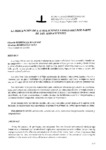Mostrar o rexistro simple do ítem
La percepción de las relaciones familiares por parte de los adolescentes
| dc.contributor.author | Rodríguez Machado, Eduardo | |
| dc.contributor.author | Domínguez Cuña, Abraham | |
| dc.date.accessioned | 2010-01-26T13:24:18Z | |
| dc.date.available | 2010-01-26T13:24:18Z | |
| dc.date.issued | 2003 | |
| dc.identifier.citation | Revista galego-portuguesa de psicoloxía e educación, 2003, 9: 375-385 ISSN: 1138-1663 | es_ES |
| dc.identifier.issn | 1138-1663 | |
| dc.identifier.uri | http://hdl.handle.net/2183/6950 | |
| dc.description.abstract | [Resumen] A lo largo del proceso de crianza y educación se forman relaciones interpersonales basadas en un compromiso y una implicación emocional entre padres e hijos que van creando y dando forma al clima afectivo y emocional de la familia. Junto a ellas, existen otras relaciones que se ven moduladas por la misión educativa de los padres de socializar a los hijos en las normas y valores del entorno cultural próximo. Las relaciones interpersonales y el flujo permanente de afectos y emociones ligadas a las otras personas, con las que el individuo vive, le proporcionan la tonalidad afectiva y la impronta moral que, en el fragor del devenir de la vida cotidiana, se convierten en parte de su propia personalidad. Son necesarias tres grandes condiciones para establecer relaciones personales satisfactorias: seguridad emocional, apoyo social e intimidad corporal. La educación afectiva pretende ayudar a que niños y adolescentes resuelvan estas necesidades en el marco de un desarrollo afectivo y sexual equilibrado, en el que la autoestima, el control interno, las habilidades sociales e interpersonales y la responsabilidad compartida adquieren una especial importancia. El ser humano tiene necesidades sociales, afectivas y sexuales que son propias de la especie. En la infancia y la adolescencia estas necesidades se ponen de manifiesto de forma especialmente evidente | |
| dc.description.abstract | [Abstract] Along the process of upbringing and education they are formed interpersonal relationships based on a commitment and an emotional implication among parents and children that go creating and giving form to the affective and emotional climate ofthe family. Next to them, they exist other relationships that they are modulated by the educational mission of the parents of socializing the children in the norms and values of the next cultural environment. The interpersonal relationships and the permanent flow of affections and bound emotions to other people, with those that the individual lives, they provide him the affective tonality and the moral impronta that, in the peal of becoming of the daily life, they become partly of his own personality. They are necessary three big conditions to establish satisfactory personal relationships: emotional security, 1 support social and corporal intimacy. The affective education seeks to help to that children and adolescents solve these necessities in the mark of a balanced affective and sexual development, in the one that the self-esteem, the internal control, the social and interpersonal abilities and the shared responsibility acquire a special importance. The human being has social, affective and sexual necessities that are characteristic of the species. In the childhood and the adolescence these necessities show in a specially evident way | |
| dc.language.iso | spa | es_ES |
| dc.publisher | Universidade da Coruña | es_ES |
| dc.subject | Adolescentes | es_ES |
| dc.subject | Estudios de casos | es_ES |
| dc.subject | Relaciones interpersonales | es_ES |
| dc.subject | Cohesión y adaptabilidad | es_ES |
| dc.subject | Adolescents | es_ES |
| dc.subject | Case student | es_ES |
| dc.subject | Interpersonal relations | es_ES |
| dc.subject | Cohesion and adaptability | es_ES |
| dc.title | La percepción de las relaciones familiares por parte de los adolescentes | es_ES |
| dc.type | info:eu-repo/semantics/article | es_ES |
| dc.rights.access | info:eu-repo/semantics/openAccess |






